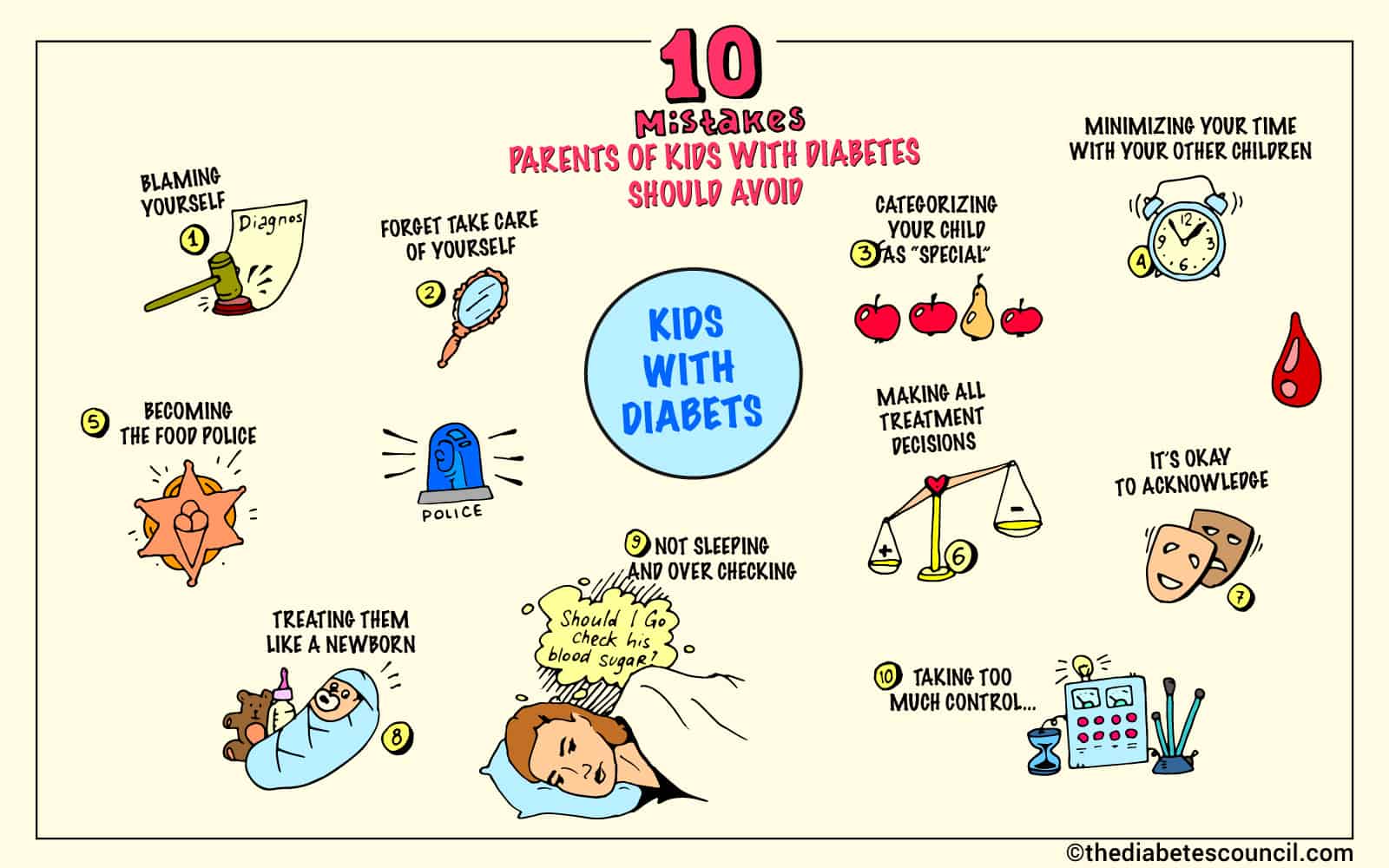Parenting is a monumental job for anyone, from school to extracurricular activities and more. But when you add in the constant monitoring and treatment of a chronic illness like diabetes, it’s no wonder parents are tired, stressed and feel as if nothing is in their control.
When a child has a chronic illness like diabetes (type 1 or type 2), it is not just the child’s illness, it is a family illness. No matter the age of your child who has diabetes, there are many mistakes that we as parents make. Yes, we make mistakes, I’m admitting it for you, we’re only human. If you are new to the world of diabetes, you can learn from our mistakes.
Contents
- 1. Blaming Yourself
- 2. Forget to Take Care of Yourself
- 3. Categorizing Your Child as “Special”
- 4. Minimizing Your Time with Your Other Children
- 5. Becoming the Food Police
- 6. Making All Treatment Decisions
- 7. It's Okay To Acknowledge
- 8. Treating them Like a Newborn
- 9. Not Sleeping and Over Checking
- 10. Taking Too Much Control…
1. Blaming Yourself
You are NOT to blame for your child’s diagnosis of diabetes.
This is one of the biggest weights that many parents carry on their shoulders, especially in the beginning. Having a diagnosis of something so significant like this can take its toll on you. It makes you rethink your parenting strategies and really look at what you could have done to avoid it. Well, I’m here to tell you that you are not to blame. You did not cause your child’s diabetes.
Instead of thinking about what you could have done differently to avoid this from happening, it’s time to think about what you can do NOW to teach your child that things in life such as this happen, and it’s best to learn how to live a happy and healthy life, even with diabetes in it.
2. Forget to Take Care of Yourself
Another common mistake that many parents make is to forget about themselves. Yes, it’s overwhelming and time consuming to take care of a child with a chronic illness, but that doesn’t mean you get to toss your needs by the wayside. It’s important to still take time to make sure you are eating and sleeping enough as well as follow through with your medical appointments.
Your child’s health is important but so is yours. You cannot care for them and provide the attention to their needs they require if you are sick. Remember to take time for yourself. It’s okay to treat yourself once in a while to a break out of the house. Use this time to refresh and relax. This will allow you to be more energized and able to care for the needs of your child.
For more informative articles read the following:
3. Categorizing Your Child as “Special”
Diabetes is tough for kids and it’s tough for the family. If you have other children, they often feel left out with all the attention that their sibling is getting from doctor’s appointments or mom and dad’s attention to blood sugar checks, injections and more.
One of the biggest mistakes you can make when you are first starting out is to categorize your child as ‘special’. All children are special and amazing, having a chronic illness doesn’t make them any more special than your other children. They just require a bit more attention and care. Because of the added attention, putting them into this ‘special’ category can do more harm than good. Instead, treat them as if they were a normal child without diabetes in the mix.
A wise lady once told me, if your child with diabetes comes to you to ask to go to a sleepover, a vacation, a dance, etc. Ask yourself this question. “What would your answer be if they didn’t have diabetes”, because that answer should ALWAYS be your answer even with diabetes.
4. Minimizing Your Time with Your Other Children
Yes, your child with diabetes will require more of your time and attention, but you don’t want to start taking that time away from what you spend with your other kids. Be sure to give them additional attention as well, because they are going to need it.
If you think being the parent to someone with diabetes is hard, try being the sibling. They worry, they have stress, they fear that something will happen, and yes they get jealous of all that extra time and attention, it’s only natural. By giving them their own special time with you without having to think of diabetes, you can help to decrease their stress levels and provide them with the attention they deserve.
5. Becoming the Food Police
We all know sweets and yummy treats aren’t the healthiest for us, especially when there is diabetes in the mix. But this doesn’t mean they have to stop having them all together. In moderation, anyone can enjoy something tasty from time to time. Stop being the food police when it comes to treats and other goodies. When something is off limits you tend to want it more. By forbidding and denying your child these types of foods now, you can create unhealthy behaviors in the future such as sneaking and overindulgence. Instead, allow them to eat them in moderation along with a healthy diet. Don’t create this stigma around certain foods, teach them to make healthier choices now so that it will benefit them in the future.
6. Making All Treatment Decisions
If your child is younger, you will be more responsible for making decisions regarding the treatment of their diabetes, this cannot be avoided. But as they get older, it’s important for them to be handed more responsibility when it comes to their disease. One of the ways you can do this is to allow them to have some input in their treatment options.
If you feel your 14-year-old should go on the pump, but she is adamant that she wants to stay on multiple daily injections, you need to listen to her to find out why she thinks this treatment method would be best. It’s their body, and their disease, they need to learn how to navigate the waters so they can have better, well-managed health in the future.
7. It's Okay To Acknowledge
This may sound silly, but as parents we often times believe that we must be strong, and show no emotion. We have to be strong, and put up a front for others as well as for our children. When we hold onto these feelings, we do not allow ourselves to take the proper time needed to actually grieve and acknowledge what actually happened.
Not just for us, but for our children. They are often faced with a not so carefree childhood, where they actually have to watch what they eat. We have to specially prepare their foods for them, and sometimes they can't enjoy what other people eat. Our children must acknowledge it, and accept the wonderful life that they do have in front of them. Accept that they have people who love them no matter what.
If you do not allow yourself the time to properly acknowledge and mourn this loss, it can send you into a spiral that will be hard to break free from. Depression is linked to diabetes, not just those who suffer from the disease but their caregivers as well.
You have to allow yourself to release the feelings you are holding onto in order to accept the new life you have in front of you. If it helps to talk to someone, counseling can be a great way to express the sorrow you are feeling, and allow yourself to accept your child’s new life. They can still have an amazing childhood even with diabetes.
8. Treating them Like a Newborn
You know what I’m talking about here. When you are a first time parent and especially if you’ve never had experience with a baby, there is a period that you feel as if you will ‘break’ them. Now we know babies are not the fragile little beings we thought they were in the beginning. Treating your child with diabetes as if they will break, or get sick, is not the way to teach them to live their life to the fullest.
So, they have diabetes, there is nothing you can change about that. That may sound harsh, and I apologize for that but it’s the truth. What good is it going to do for you and for them if you treat them as a fragile little creature that cannot do anything fun? Trust me, as soon as you learn that they are still amazing kids underneath, a whole world of opportunities will open up for you and them.
9. Not Sleeping and Over Checking
Nighttime is one of the scariest things that many parents with children who have diabetes face. The uncertainties of knowing what their blood sugar is doing during the night is a thing of nightmares for many parents. But staying up during the wee hours of the morning to check hour after hour isn’t going to help you or them.
I get it, believe me, there were times I wanted to check every few hours and would stay awake just to do so. But the only results in the morning were a sleepless, zombie like mom who was a bit crabby to say the least. I learned to sleep, to read my child’s body, and to relinquish a little bit of my control.
I will check each kid before I go to bed. If their number is relatively decent and I have a good feeling they will not drop during the night, I go to bed. GASP! Yes, I go to bed. The results of me staying awake all hours of the night to check and the results of me checking before bed and going to sleep are the same, my children wake up happy and healthy, with one minor change, mom is NOT a zombie bear in the morning.
Further reading:
Now with that being said, if it warrants, a high blood sugar or a stubborn low blood sugar I cannot get up easily, I most definitely will stay up to retest, or set an alarm 2 hours later to get up and test. But for those normal, in range numbers, I go to bed. Trust your gut, my gut has gotten me far in this world in raising two children with diabetes, and yours will do the same.
10. Taking Too Much Control…
Here’s an important piece of advice I will give you… “It’s not YOUR disease” …. WOW that is a tough one to hear I know, believe me I know. But it’s the truth, and sometimes the truth is difficult to swallow. You don’t want to take over every single aspect of your child’s diabetes. Granted if they are younger you have to be in charge and responsible for more things, but as they grow older they can slowly learn to handle a few things on their own. Even my 5-year-old can test herself. With my oldest who is now 12, we slowly introduced a new ‘diabetes’ responsibility on him each year. Started with testing, keeping track of numbers, learning to change his pump site, learning to carb count, so that now going into age 13, I am confident that he can handle everything with his care.
When he goes off to college, he is not leaving diabetes behind for me to take care of. He’s taking it with him. Don’t set your children up for failure by taking over more of their disease than you need to. Allow them to learn how to handle it, at their own pace, so that when they grow older and have to leave, you will know that they will be able to manage their disease in a way you can be proud of.
Please post any comments you have on this topic.
TheDiabetesCouncil Article | Reviewed by Dr. Jerry Ramos MD on June 08, 2020
















